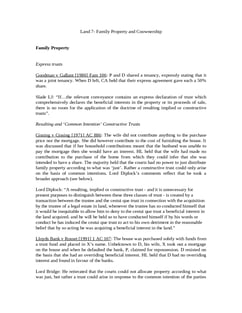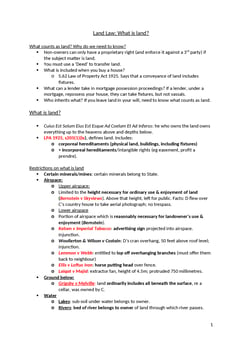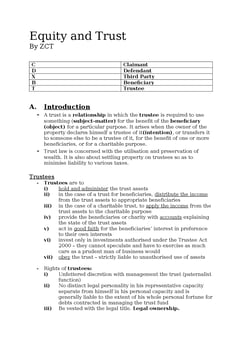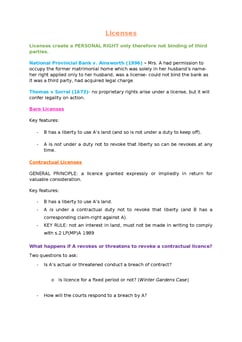Jones v Kernott [2012] 1 AC 776; UKSC 53
Judgement for the case Jones v Kernott
Table Of Contents
KEY POINTS
The basic principle is that equity aligns with the law, and in this case, both legally and in terms of equity, they are considered joint tenants.
-
However, the abovementioned presumption can be rebutted by demonstrating either:
That the parties had a distinct shared intention at the time of acquiring the property, or
That they subsequently developed a shared intention to alter their respective shares.
-
In situations where it is evident that either:
The parties did not originally intend to jointly own the property, or
They had altered their initial intention but there is no direct or inferred evidence to determine their specific intentions regarding the property shares, the court will determine what it considers to be a fair share for each party based on their overall interactions and dealings related to the property.
FACTS
Ms. Jones and Mr. Kernott were in a relationship, had two children, and jointly purchased a house in Thundersley, Essex in 1985. No clear declaration was made about the beneficial ownership of the property. They shared the mortgage and upkeep of the house until their relationship deteriorated, and Mr. Kernott moved out in 1993.
Ms. Jones and the children continued to live in the house. In 2006, Mr. Kernott expressed his desire to claim a share in the property. Ms. Jones sought a declaration in 2007 stating that she owned the entire beneficial interest.
Referring to a previous legal case, the judge determined that in the absence of clear evidence on how the property should be divided, the court should infer or impute an intention that reasonable and fair individuals would have intended.
The judge awarded Mr. Kernott a 10% share.
Mr. Kernott appealed the decision, arguing against inferring a change in common intention and the judge's intervention in deciding a fair division.
COMMENTARY
Jones v Kernott highlights the importance of considering the entire course of dealings between the parties and their contributions to the property.
In this case, the court awarded Mr. Kernott a 10% share based on factors such as his reduced contributions towards the house and limited financial support for their children.
This case underscores the flexibility of constructive trusts to achieve an equitable outcome, taking into account the specific circumstances and conduct of the parties involved.
ORIGINAL ANALYSIS
This was a dispute about the shares of parties in family property (it was agreed that they both had a share - question was how much).
Strauss QC
-
Made several points:
-
To determine their respective shares, where the actual (express or inferred) intentions cannot be determined or are non-existent, the court can attribute an intention to the parties that they didn’t really have on the grounds of what would be fair and equitable. This involves imputing an intention that the courts didn’t really have or was at least ‘unexpressed’.
NB he doesn’t say whether this also applies to finding a trust in the first place;
-
Common intentions (actual or imputed) can change over time and one should look at the intentions by the end of the relationship.
This is wrong in principle: if a trust arises because of a common intention on day 1, it surely cannot be assessed by the intentions on day 100;
-
the presumption of a 50-50 split was overturned on the basis that the parties kept separate finances and there was an imbalance in contributions.
This is problematic: if he is using ‘imputed’ intentions, there is no need to draw on evidence for actual intentions.
-
For Further Study on Jones v Kernott

Land Law notes fully updated for recent exams at Oxford and Cambridge. ...

A collection of the best GDL notes the director of Oxbridge Notes (an O...

Equity notes fully updated for recent exams at Oxford and Cambridge. Th...
Need instant answers? Our AI exam tutor is here to help.
Ask questions 🙋 Get answers 📔 It's simple 👁️👄👁️
Our AI is educated by the highest scoring students across all subjects and schools. Join hundreds of your peers today.
Get StartedRelated Product Samples
These product samples contain the same concepts we cover in this case.
| Land Law | Family Property Notes (5 pages) |
| GDL Land Law | Trusts Of The Family Home Notes (6 pages) |
| Trusts and Equity | Trusts Of The Family Home Notes (21 pages) |
| Property Law | Trusts Of The Family Home Notes (12 pages) |

 Since 2010, Oxbridge Notes has been a trusted education marketplace, supplying high-quality materials from top achievers at universities like Oxford, Cambridge, LSE, Harvard, and Yale.
Since 2010, Oxbridge Notes has been a trusted education marketplace, supplying high-quality materials from top achievers at universities like Oxford, Cambridge, LSE, Harvard, and Yale.